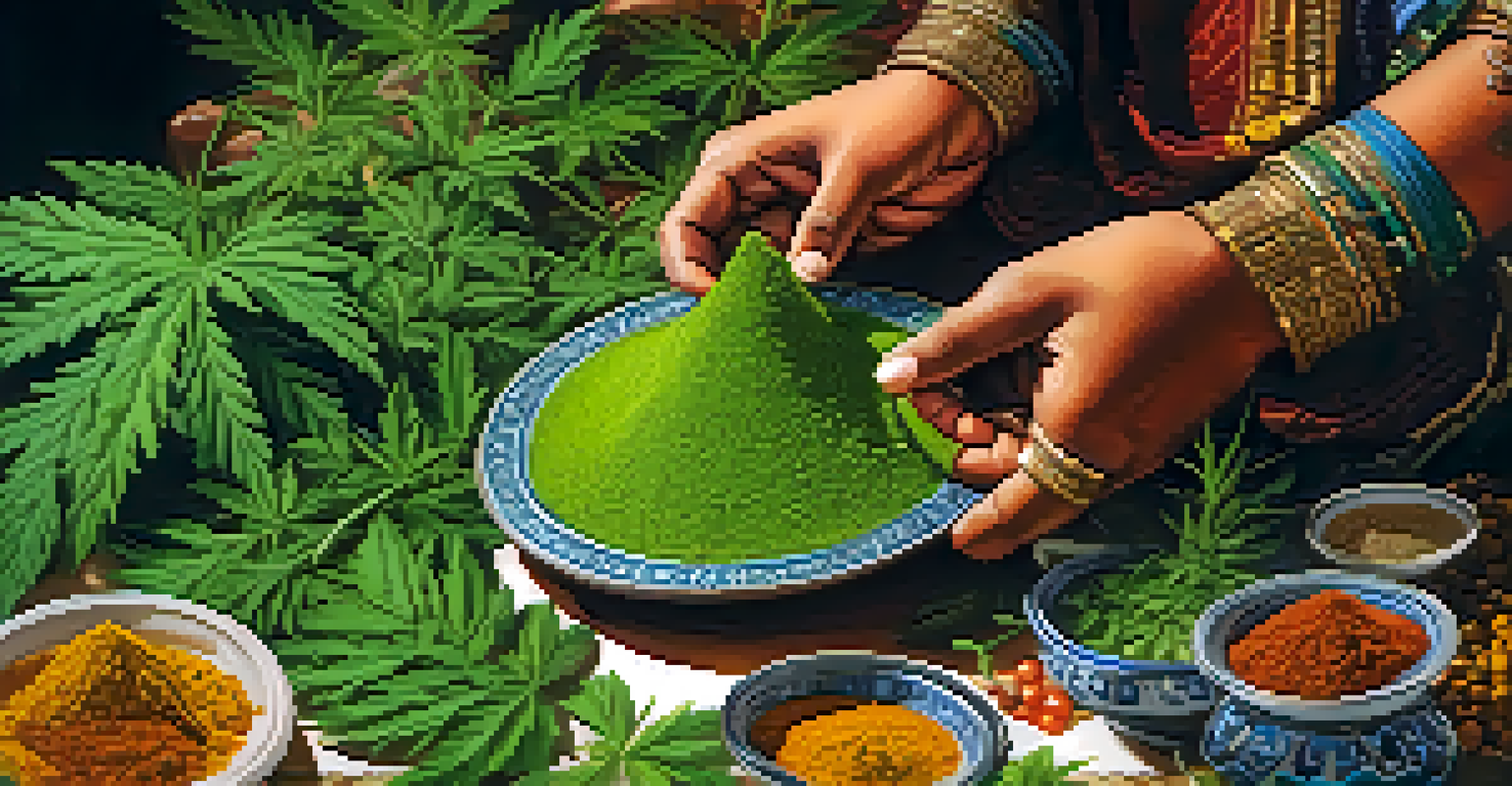Marijuana in Rituals: Spiritual Significance Across Cultures

The Historical Roots of Marijuana in Spiritual Practices
Marijuana has been used for centuries in various cultures for its spiritual properties. Ancient texts and archaeological finds show that its use dates back thousands of years, particularly in Asia. For example, in ancient China, cannabis was often used in religious ceremonies and was believed to connect individuals to the divine.
Marijuana is a sacred herb that can help people connect with the spirit world and each other.
The historical significance of marijuana is not just limited to China; it has also played a crucial role in Hindu rituals in India. The plant is associated with Lord Shiva, and its consumption during festivals like Holi is meant to enhance spiritual experiences. Such examples highlight how marijuana's historical roots are deeply intertwined with spirituality across different civilizations.
Understanding these historical contexts allows us to appreciate how marijuana transcends its modern recreational use, revealing layers of cultural significance that have influenced countless rituals. This rich tapestry of history sets the stage for its continued use in spiritual practices worldwide.
Marijuana and Shamanic Traditions: A Path to Healing
In many indigenous cultures, shamans use marijuana as a tool for healing and connecting with the spirit world. This practice often involves rituals designed to invoke spiritual guidance, using the plant to facilitate altered states of consciousness. For shamans, marijuana is not just a substance; it’s a sacred ally in their quest for knowledge and healing.

For instance, in some Amazonian tribes, marijuana is incorporated into ceremonies to help individuals confront and heal deep-seated traumas. The ritualistic use of the plant allows participants to explore their inner selves, often leading to profound personal transformations. This illustrates how marijuana can serve as a bridge between the physical and spiritual realms, fostering a sense of community and healing.
Marijuana's Spiritual History
Marijuana has deep historical roots in various cultures, used for spiritual and religious practices that connect individuals to the divine.
By understanding these shamanic practices, we can see marijuana as a spiritual vessel that guides individuals on their journey toward self-discovery and healing. This perspective broadens our appreciation for the plant's role beyond mere consumption, emphasizing its importance in spiritual rituals.
Marijuana in Hinduism: Connection to the Divine
In Hindu culture, marijuana holds a significant place, particularly during religious festivities. The use of bhang, a traditional preparation of cannabis, is common during celebrations like Holi and Maha Shivaratri. Devotees believe that consuming bhang enhances their spiritual experience and helps them connect more deeply with the divine.
The use of bhang during festivals is not just for enjoyment, but a way to connect with the divine and enhance spiritual experiences.
The association of marijuana with Lord Shiva underscores its reverence in these rituals. Worshippers consume bhang to honor Shiva, seeking blessings and spiritual insight. This connection highlights how marijuana is not merely a casual indulgence but a key component of meaningful religious expression.
Thus, the role of marijuana in Hinduism exemplifies how cultural beliefs can shape the spiritual significance of a substance. It emphasizes the idea that rituals involving marijuana are deeply rooted in tradition, serving as a means of spiritual communion rather than just recreational use.
The Role of Marijuana in African Spirituality
In various African cultures, marijuana is often used in spiritual ceremonies, symbolizing purification and connection with ancestors. Many tribes incorporate cannabis into rituals aimed at communicating with the spiritual realm, seeking guidance or healing. This practice is not just about the substance itself, but about the communal experience it fosters.
For example, in Rastafarian culture, marijuana is considered a sacrament that enhances meditation and spiritual enlightenment. The act of smoking together during rituals strengthens community bonds and creates a shared spiritual experience. This highlights how marijuana plays a multifaceted role in promoting unity and collective spirituality.
Healing in Shamanic Traditions
In many indigenous cultures, marijuana serves as a sacred ally for shamans, facilitating healing and spiritual guidance through ritualistic use.
The significance of marijuana in African spirituality reflects a broader theme of how substances can serve as tools for connection—both with the divine and within the community. It underscores the idea that marijuana rituals are rich in meaning, offering insights into cultural values and beliefs.
Marijuana and the Ceremonial Use in Native American Cultures
In many Native American cultures, marijuana is not traditionally used, but some tribes have incorporated it into their spiritual practices. These tribes often view the plant as a sacred medicine that aids in healing and spiritual growth. The ceremonial use of marijuana in these contexts is usually accompanied by prayer and drumming, creating a sacred atmosphere.
For instance, the use of marijuana in some ceremonies is intended to enhance visionary experiences, allowing participants to connect with their ancestors or spirit guides. This highlights the importance of intention in these rituals, where marijuana serves as a facilitator for deeper spiritual exploration.
By recognizing the nuances of marijuana's role in various Native American spiritual practices, we can appreciate its significance as more than just a plant. It becomes a tool for connection, healing, and a deeper understanding of one's place in the universe.
Modern Spiritual Practices: Marijuana as a Tool for Meditation
In contemporary spiritual practices, many individuals use marijuana as a tool for enhancing meditation and mindfulness. Practitioners believe that it can help quiet the mind, allowing for a deeper exploration of consciousness. This modern approach mirrors ancient practices, emphasizing the plant's enduring relevance in spiritual exploration.
For example, yoga practitioners often incorporate marijuana into their sessions to deepen their experience. The combination of mindful movement and the effects of marijuana can lead to heightened states of awareness and spiritual connection. This practice illustrates how the plant can facilitate personal growth and self-discovery.
Modern Ethical Considerations
As marijuana gains popularity, it is essential to approach its use in spiritual rituals with mindfulness, respecting cultural traditions and sourcing responsibly.
As we see the integration of marijuana into modern spirituality, it becomes clear that its significance transcends cultural boundaries. It serves as a bridge between ancient traditions and contemporary practices, offering individuals a means to connect with themselves and the universe on a deeper level.
The Ethical Considerations of Using Marijuana in Rituals
As marijuana becomes more mainstream, discussions about its ethical use in spiritual rituals have emerged. Many advocates emphasize the importance of respecting cultural traditions and understanding the historical context of marijuana use. This awareness is crucial in preventing cultural appropriation and ensuring that rituals are conducted with genuine respect.
Moreover, the conversation around ethical use includes considerations about the source and quality of the marijuana used in rituals. Participants are encouraged to seek out organically grown, sustainably sourced cannabis to honor the plant’s sacredness. This practice reflects a growing awareness of the environmental and social implications of cannabis cultivation.

Ultimately, the ethical considerations surrounding marijuana in rituals remind us to approach its use with mindfulness and respect. By honoring its cultural significance and ensuring responsible practices, we can cultivate a deeper appreciation for marijuana's role in spirituality.